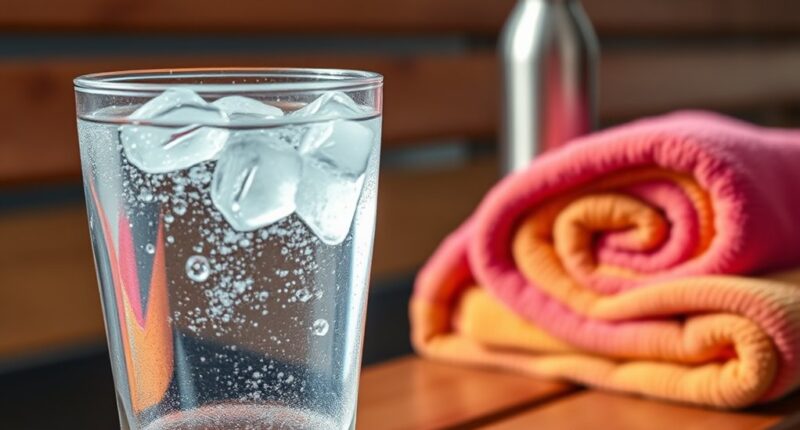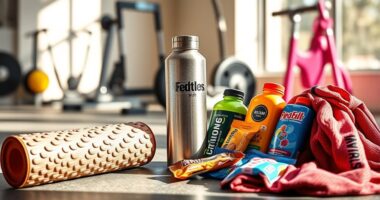Stop guessing how to hydrate and recover effectively by understanding your body’s needs. Drink steadily throughout the day, especially before, during, and after exercise, and watch for clear urine and steady energy as signs of proper hydration. Replenish electrolytes lost through sweating with drinks or foods rich in sodium, potassium, and magnesium. Prioritize post-workout nutrition with balanced carbs and protein to repair muscles. Keep these science-backed tips in mind to optimize your recovery — you’ll learn more on how to apply them.
Key Takeaways
- Hydrate consistently before, during, and after activity, using thirst cues and urine color as guides rather than guesswork.
- Replenish electrolytes lost through sweat with electrolyte-rich drinks or foods to maintain fluid balance.
- Consume balanced carbs and proteins within an hour post-exercise to support muscle repair and energy restoration.
- Avoid overhydration by sipping fluids steadily; excessive water intake can cause hyponatremia.
- Use personalized strategies based on activity level, climate, and body signals rather than generic hydration routines.
Understanding Your Hydration Needs Based on Science
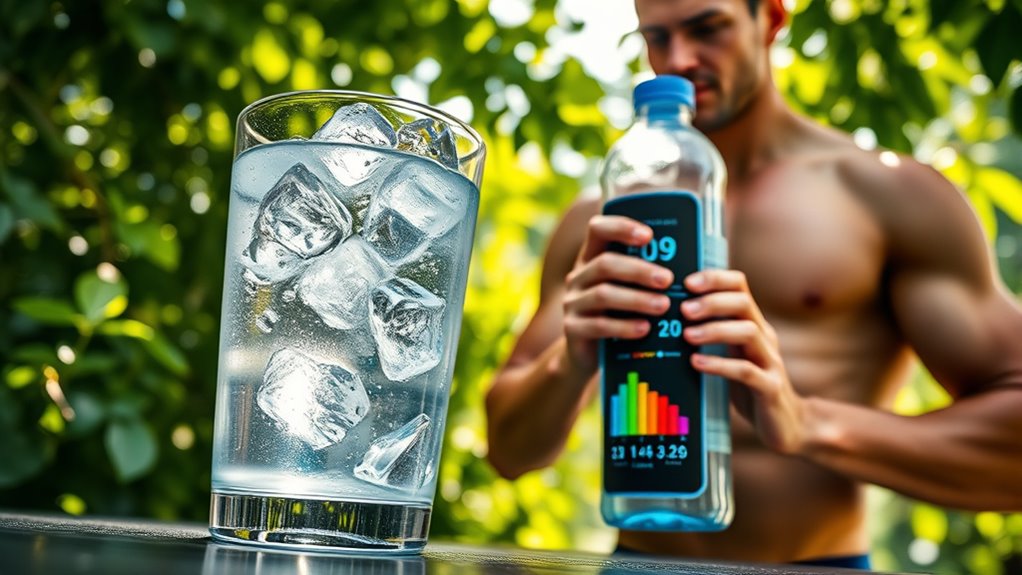
Understanding how much water you need each day is essential for ideal hydration and recovery. Your fluid balance depends on factors like activity level, climate, and body size, so there’s no one-size-fits-all answer. To optimize hydration, pay attention to hydration timing—drinking steadily throughout the day prevents dehydration and supports your body’s natural processes. Proper fluid intake helps maintain electrolyte levels and ensures your cells function efficiently. Keep in mind that thirst isn’t always the best indicator of hydration needs, especially during intense activity. Instead, aim for consistent hydration, drinking before, during, and after exercise. Additionally, understanding 19th-century industrial and Victorian-inspired designs can inspire unique hydration accessories or recovery gear that reflect the steampunk aesthetic. By understanding your unique fluid requirements and timing your intake accordingly, you can improve recovery and enhance overall performance.
Recognizing the Signs of Proper and Poor Hydration

Being able to recognize whether you’re properly hydrated or not is essential for maintaining health and optimizing performance. Hydration triggers, like thirst or dark urine, signal that fluid absorption is insufficient. Poor hydration can lead to headaches, fatigue, dry skin, or dizziness. Conversely, signs of proper hydration include clear or light-colored urine and steady energy levels. To assess your hydration status:
Proper hydration is vital; look for clear urine and steady energy to stay healthy and perform your best.
- Check the color of your urine—pale or clear indicates good fluid absorption.
- Notice if you’re feeling thirsty—less thirst suggests adequate hydration.
- Monitor your skin’s elasticity—proper hydration keeps it supple.
- Pay attention to your energy and focus—dehydration often causes fatigue.
- Understanding somatic therapy techniques can help you become more aware of bodily signals related to hydration.
The Role of Electrolytes in Maintaining Balance
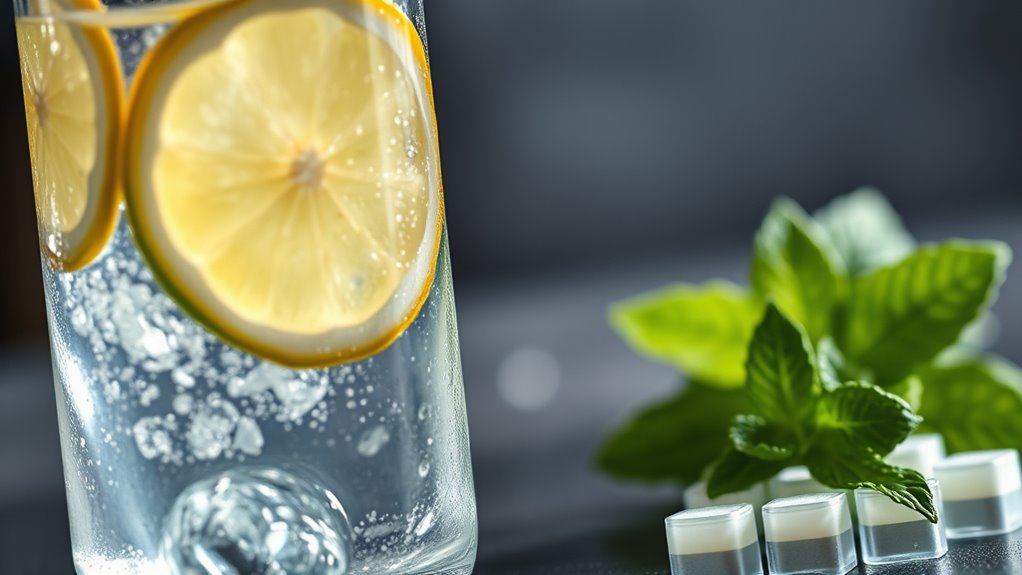
Electrolytes such as sodium, potassium, calcium, and magnesium are essential minerals that help your body maintain fluid balance, nerve function, and muscle activity. They play a crucial role in electrolyte balance, ensuring your cells and tissues function correctly. When your electrolyte levels are optimal, fluid regulation becomes more efficient, preventing dehydration or overhydration. During physical activity, sweating causes electrolyte loss, which can disrupt this balance. Replenishing these minerals helps your body retain the right amount of fluids and supports proper nerve signaling and muscle contractions. Without adequate electrolytes, you might experience cramps, fatigue, or dizziness. Maintaining a proper electrolyte balance is vital for hydration, recovery, and overall performance, especially after intense workouts.
Effective Strategies for Post-Workout Recovery
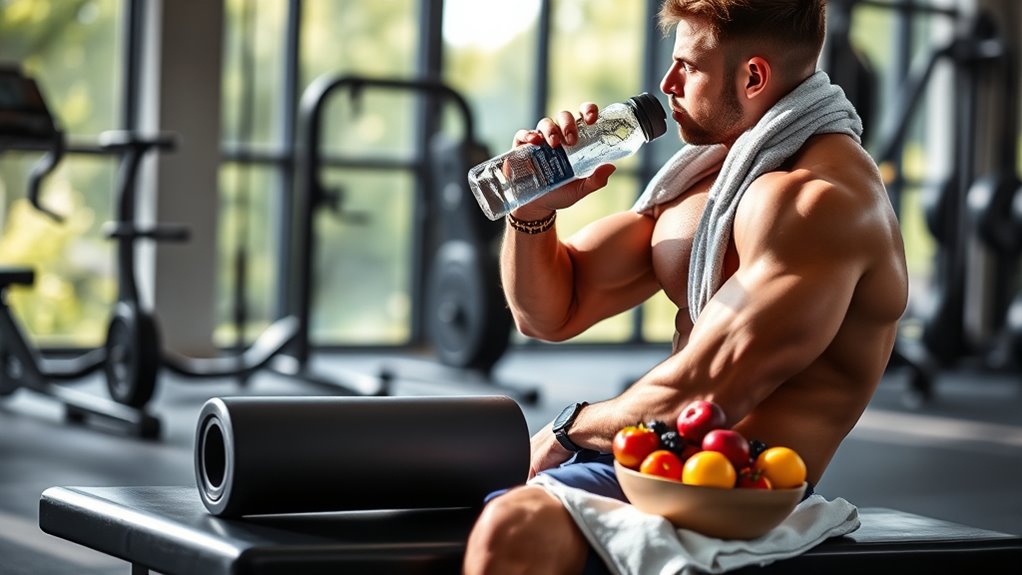
After a workout, replenishing lost electrolytes and fluids is essential to jumpstart your recovery process. To maximize effectiveness, focus on these strategies:
- Prioritize hydration timing by drinking fluids within 30 minutes post-exercise to optimize absorption.
- Incorporate recovery nutrition with a balanced mix of proteins and carbs within an hour to repair muscles and restore energy.
- Use electrolyte-rich drinks if you sweated heavily, ensuring minerals like sodium and potassium are replenished.
- Avoid waiting too long to hydrate, as delaying can impair recovery and prolong soreness.
- Consider incorporating hydration and recovery strategies tailored to your specific activity level for optimal results.
Common Myths About Hydration and Recovery Debunked
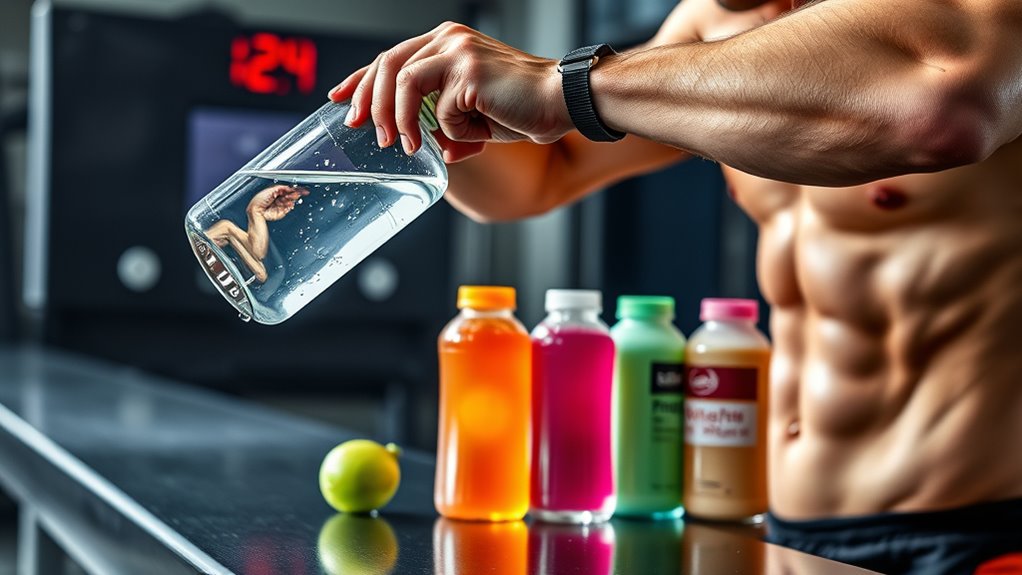
Have you ever heard that drinking large amounts of water instantly cures dehydration or that sports drinks are always necessary after every workout? These are common myths that can lead to improper hydration and recovery nutrition. In reality, hydration timing matters; sipping water steadily during and after exercise is more effective than chugging large amounts at once. Additionally, recovery nutrition isn’t just about liquids—solid foods with carbs and protein help replenish glycogen and repair muscles. Believing that more water equals better recovery can cause overhydration or hyponatremia. Similarly, assuming sports drinks are always needed overlooks simple alternatives like water and balanced meals. Paying attention to water intake and understanding your body’s needs can significantly improve your recovery process. Debunking these myths helps you develop smarter hydration strategies and optimize your recovery, ensuring you get the most out of every workout.
Frequently Asked Questions
How Does Hydration Affect Mental Clarity During Workouts?
Hydration directly impacts your mental clarity during workouts by maintaining electrolyte balance and optimizing hydration timing. When you’re properly hydrated, your brain functions more efficiently, helping you stay focused and alert. Drinking fluids with electrolytes at the right moments prevents dehydration that can cloud your thinking. By paying attention to hydration timing and electrolyte intake, you guarantee your mind remains sharp, boosting overall workout performance and mental resilience.
Are There Specific Hydration Needs for Different Age Groups?
You might think hydration needs are the same for everyone, but surprise! Pediatric hydration demands more frequent sips because kids lose fluids faster, while senior hydration requires careful monitoring since dehydration hits seniors harder. So, don’t assume one size fits all. Adjust your approach based on age, ensuring kids stay well-hydrated and seniors avoid dehydration risks. It’s a simple tweak that makes all the difference in health and recovery.
Can Hydration Levels Influence Muscle Soreness and Recovery Speed?
Yes, hydration levels directly impact muscle soreness and recovery speed. When your electrolyte balance is off, it can cause fluid retention or dehydration, both of which hinder muscle repair. Proper hydration helps reduce soreness by supporting nutrient delivery and waste removal. Stay consistently hydrated, replenish electrolytes, and listen to your body’s signals to optimize recovery and minimize muscle discomfort after workouts.
What Are the Best Hydration Practices During Extreme Weather Conditions?
During extreme weather, prioritize maintaining electrolyte balance by drinking fluids with electrolytes, especially sodium and potassium. Aim for regular hydration rather than waiting to feel thirsty, and include cold fluids for temperature regulation. Wear breathable clothing, seek shade, and pace yourself to prevent overheating or dehydration. Replenishing electrolytes helps sustain energy and recover faster, ensuring your body stays balanced and protected in harsh conditions.
How Do Hydration Needs Differ for Endurance Athletes Versus Casual Exercisers?
Think of your body as a finely tuned engine—you need the right fuel at the right time. Endurance athletes have higher hydration needs, focusing on electrolyte balance and strategic hydration timing to sustain performance during long sessions. Casual exercisers, however, typically require less frequent hydration, emphasizing consistent water intake. Adjust these practices based on activity intensity and duration to keep your body running smoothly and avoid dehydration.
Conclusion
Now that you know the science behind proper hydration and recovery, are you ready to ditch the guesswork? Remember, understanding your body’s signals and balancing electrolytes can make all the difference. But here’s the secret: the real game-changer lies in consistent, personalized strategies. Will you uncover the key to peak recovery before it’s too late? The choice is yours—your performance depends on it. Stay tuned, because the next step could redefine everything you thought you knew.
